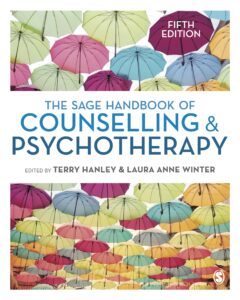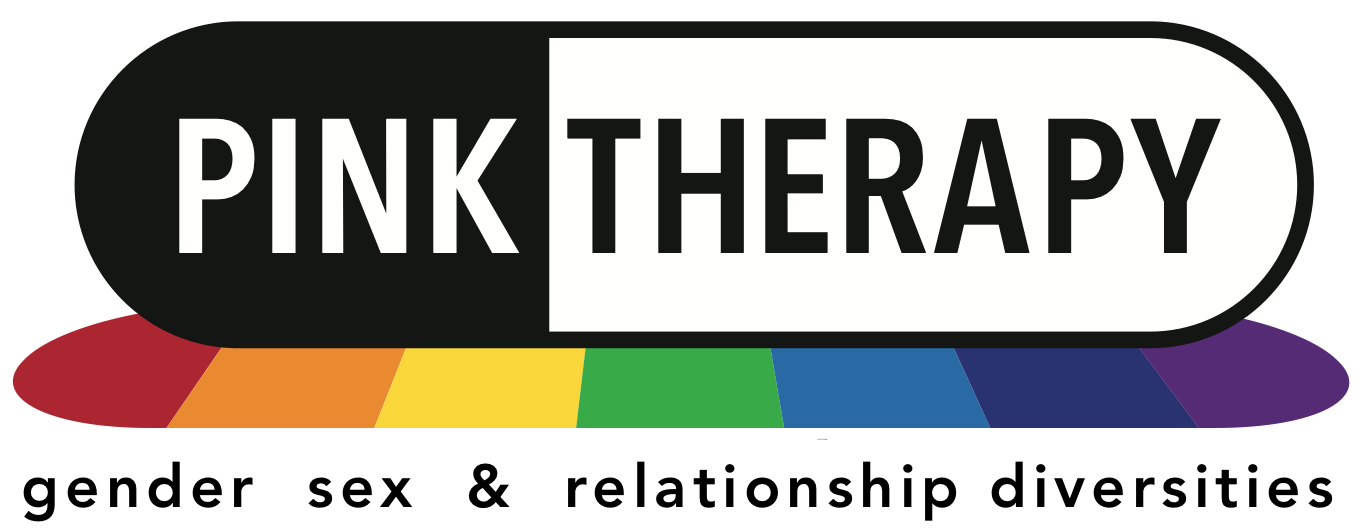 Introduction
Introduction
Gender, sex, and relationship therapy (GSRD) is an emergent psychotherapy building on the affirmative traditions of relational and humanistic schools and harnessing some of the techniques of third-wave cognitive behavioural therapy, which can be especially effective with LGBTQIA+ clients. It has recently been described by Davies and Neves (2023) and recognised as an accredited psychotherapy training offered by Pink Therapy. The approach is crucial in providing support, guidance, and healing to individuals navigating the complex landscape of identity, sexuality, and interpersonal connections. To address clients’ diverse needs effectively, therapists must embrace a comprehensive approach incorporating the six core components outlined in this brief paper. By committing to social justice, demonstrating cultural humility and competency, understanding the impact of oppression, adopting a trauma-informed approach, embracing contemporary sexological perspectives, and drawing on core GSRD theories, therapists can create a safe and inclusive environment for their clients. This essay explores these components and their significance in gender, sex, and relationship therapy.
1. Commitment to Social Justice
The basis of GSRD Psychotherapy is rooted in social justice, much like its predecessors, Feminist Therapy and Black Psychology, Gender, sex, and relationship therapists must prioritise social justice in their practice. This commitment involves recognising and challenging systemic inequalities that impact marginalised individuals’ mental health and well-being. Therapists should actively work to dismantle oppressive structures and advocate for equitable access to healthcare, rights, and resources for all. By understanding the ways in which societal power dynamics influence gender and sexuality, therapists can promote social change and create a more inclusive society. Our approach challenges dualism, heteronormativity, cisnormativity and monogamism and works with clients who are often excluded by traditional systemic institutionalised power structures for whom there is no place at the table.
2. Demonstration of Cultural Humility and Cultural Competency
Cultural humility and competency are essential in gender, sex, and relationship therapy. Therapists should approach each client with an open mind, recognising that their unique cultural backgrounds shape their experiences, values, and beliefs. Therapists can build trust and effectively engage with clients by developing self-awareness and continuously educating themselves about diverse cultures and identities. This approach encourages therapists to be respectful, non-judgmental, and responsive to the specific needs of each individual or community they serve.
3. Understanding the Impact of Oppression on LGBTQIA Mental Health
Gender, sex, and relationship therapists must deeply understand the impact of oppression on the mental health of LGBTQIA individuals. Oppressive systems and societal stigma can contribute to minority stress, leading to increased rates of anxiety, depression, and substance abuse among sexual and gender minorities. By acknowledging the unique challenges faced by LGBTQIA individuals, therapists can create a safe space for exploration, validation, and healing.
We are also aware that neurodivergence is over-represented amongst all GSRD populations. Therefore GSRD Therapists need to be flexible in their approach to working with clients who have autism and or ADHD and make reasonable adjustments with regard to the duration of appointments, working flexibly and making use of the skills inherent in the third-wave CBT approach (dialectical behaviour therapy (DBT), compassion focussed therapy (CFT, acceptance and commitment therapy (ACT), in particular, have great value in working with GSRD clients who present with histories of trauma and/or neurodivergence.
4. Adopting a Trauma-Informed Approach
All GSRD people exist in a context of historical and collective trauma, in the same way that Jews were subjected to the Holocaust, gay men were also sent to the gas chamber. They were also experimented on by well-meaning psychiatrists and psychotherapists and subjected to neurosurgery, hormone therapy and intensive psychoanalysis to try the cure them. More recently, we have experienced of nail bombing in our pubs and mass shootings in our nightclubs. In parts of the world there are homosexuality and atypical gender expression are being made criminal offences. A trauma-informed approach is vital when addressing minority stress and micro-aggressions in therapy. By recognising the potential trauma associated with experiences of discrimination, therapists can create an environment that prioritises safety, trust, and empowerment. All GSRD clients will have some experience of the pervasive, distal impact of minority stress, even of they have not personally been bullied, beaten or exposed to the sneers and disdain of heterosexuals. GSRD Therapy involves understanding the ways in which individuals may have internalised societal biases and working collaboratively to challenge negative self-perceptions. Therapists must also remain aware of their biases and privilege, ensuring their practice is sensitive and supportive.
5. Embracing Contemporary Sexological Perspectives of Sex Positivity
Gender, sex, and relationship therapists should embrace contemporary sexological perspectives that promote sex positivity. This approach recognises that healthy sexuality is diverse, consensual, and affirming. We challenge sex-negative pop psychology ideas of ‘sex and porn addiction’ as they lack of any independent, peer-reviewed scientific evidence to support them. We help people in relationships explore their relational and sexual needs rather than jettisoning a loved partner because the sexual side of their relationship has virtually died. By fostering open conversations about sexuality and challenging societal taboos, therapists can support clients in exploring their desires, boundaries, and sexual self-expression. Encouraging a positive and non-judgmental attitude towards sex can enhance clients’ overall well-being and their relationships.
6. Utilising Core Affirmative Theory & Research
We rely for our work on citing various Core Theoretical constructs like Meyer’s Minority Stress Theory (2003), helping us understand the impact of Distal and Proximal Minority Stress on mental health. The work of Pachankis and his international team of researchers uncovering some of the reasons for the toxicity of the gay male community with their Intracommunity Minority Stress theory (2003), Dr Kevin Nadal (2013 and others have produced helpful contributions on Micro-aggressions and Strengths-based Affirmative Perspectives that focus on building resilience. We situate everything we do with a recognition of intersectionality (Turner, 2021, Freeman-Coppadge and Langroudi (2021) and how power and privilege and discrimination shape our individual experiences and identities.
Conclusion
Gender, sex, and relationship therapy necessitate a comprehensive approach that incorporates the six core components discussed in this essay. By committing to social justice, demonstrating cultural humility and competency, understanding the impact of oppression, adopting a trauma-informed approach, embracing contemporary sexological perspectives, and drawing on core theories, therapists can provide effective and inclusive support to clients. By promoting healing, empowerment, and the exploration of diverse identities and relationships, therapists can contribute to the well-being and liberation of individuals and communities. We believe these core components can be integrated across all existing modalities, but within some frameworks where there may be conflicting ideas, we need to examine and perhaps adjust long-treasured perspectives that the therapist is always right.
Dominic Davies FNCIP, FNCSP
CEO Pink Therapy
This article is based on a chapter by Davies & Neves (2023)
References
Davies, D & Neves S, (2023) Gender, Sex and Relationship Diversity Therapy in T Hanley and L. A. Winter (eds) Sage Handbook of Counselling and Psychotherapy 5th edition. Sage Publications.
Freeman-Coppadge D.J., and Langroudi K.F. (2021) Beyond LGBTQ-Affirmative Therapy: Fostering Growth and Healing Through Intersectionality. In: Nadal K.L., Scharrón-del Río M.R. (eds) Queer Psychology. Springer, Cham. https://doi.org/10.1007/978-3-030-74146-4_9
Meyer, I. H. (2003). Prejudice, social stress and mental health in lesbian, gay and bisexual populations: Conceptual issues and research evidence. Psychological Bulletin, 129(5), 674–697.
Nadal, K. L. (2013). That’s so gay! Microaggressions and the lesbian, gay, bisexual, and transgender community. Washington, DC: American Psychological Association.
Pachankis, J. E., Clark, K. A., Burton, C. L., Hughto, J. M. W., Bränström, R., & Keene, D. E. (2020). Sex, status, competition, and exclusion: Intraminority stress from within the gay community and gay and bisexual men’s mental health. Journal of Personality and Social Psychology, 119(3), 713–740. https://doi.org/10.1037/pspp0000282
Turner, D. (2021) Intersections of Privilege and Otherness in Counselling & Psychotherapy. Mockingbird. London: Routledge.
